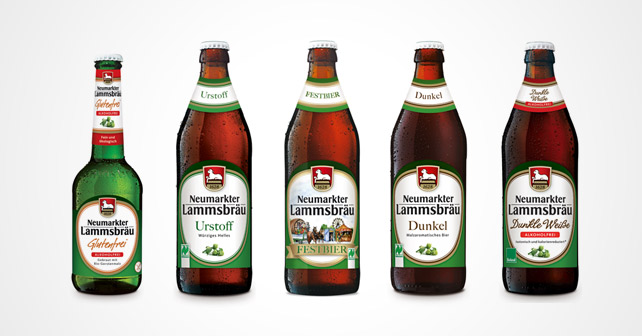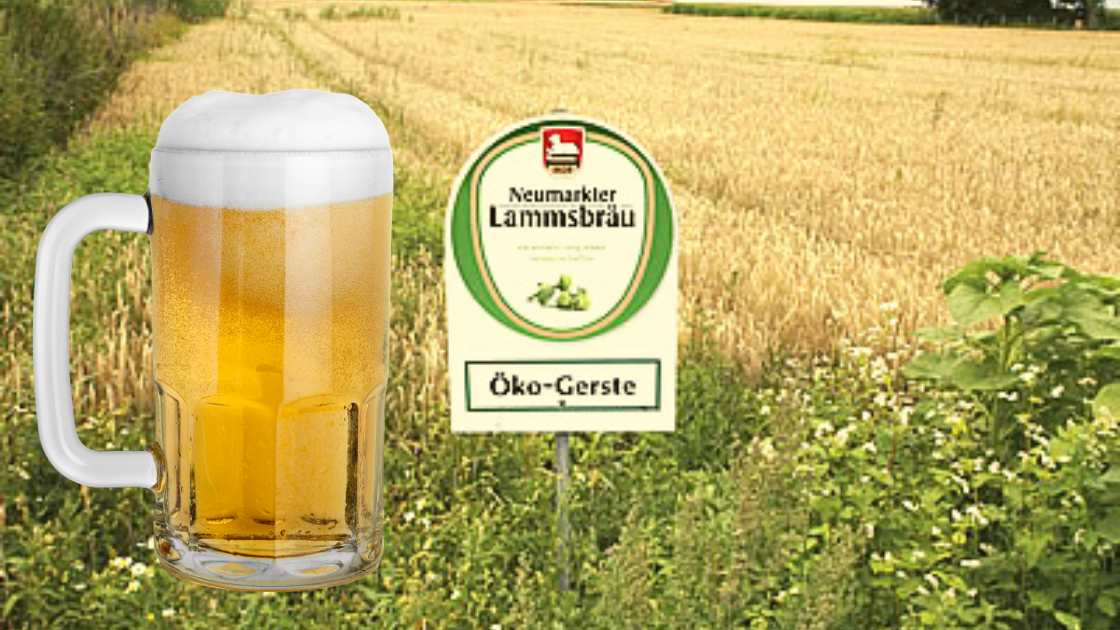Sustainable beer – meet the example of a German brewery that since 1995 has converted its entire range to 100% organic.
With 19 varieties, Neumarkter Lammsbräu also offers innovations such as the first gluten-free beer made from barley malt.
Brewery Neumarkter Lammsbräu
Neumarkter Lammsbräu is the most sustainable brewery and is regarded worldwide as a pioneer in organically produced beers.
The award-winning family company has been brewing beer for over 200 years, more than 40 of them following its own sustainable business concept.

As early as 1977, the brewery designed its own lines of environmental protection. In other words, it began to reduce energy consumption in production and to replace the resources used with sustainable alternatives. In 1978 the brewery founded a producer community (farmers) in order to be supplied in the future with organic raw materials (malting barley, brewing wheat, brewing spelt, and natural hops). It was not until 1990, however, that Neumarkter Lammsbräu’s beer could be brewed from 100% organic products.
Learn about the 10 principles that determine the company's activities to produce sustainable beer
1. We are part of the whole
Be aware that the brewery is part of the ecological and social system. As a result, they assume a holistic and comprehensive corporate responsibility in all activities. This means that in addition to their own operational environmental protection and organic food production, they are committed to creating intact, ecologically and socially sustainable living spaces. In addition, they seek to create awareness of the social necessity of sustainable living and corporate stewardship.
2. Going beyond the call of duty
The brewery believes that simply doing one’s duty is not enough for the management, and for the employees.
They are committed to going beyond compliance with existing laws and regulations. In addition, they seek to improve the environmental performance of their operations.
3. Sustainable environmental protection
Operational environmental protection is a top priority.
In doing so, they seek to minimize environmental weaknesses in all existing and future operational activities.
In addition, they use resources sparingly.
“We are guided by the most sophisticated system there is Nature. Because we assume the idea of the cycle in our business activities. This means that we promote and give preference to the use of renewable materials, return waste materials to the cycle wherever possible, pay attention to ecological standards when purchasing materials, and use reusable bottles. We critically evaluate key environmental aspects (e.g., emissions, energy consumption, waste) and take into account both direct and indirect ecological effects of our activities (i.e., those of upstream and downstream processes) and manage them continuously with the help of a holistic control system.”
4. Organic raw materials for sustainable brewing
You must grow your own organic raw materials if you want to produce them organically.
The ecological nature of farming avoids the introduction of artificial mineral fertilizers into the soil, the use of chemical pesticides and weed killers, and the cultivation of genetically modified organisms. In this way, fertile soils are preserved, humus accumulates and thus pure water is preserved, and the natural diversity of species is increased.
5. Ecological guidelines for sustainable beer production
Green beer is made in strict compliance with ecological guidelines. That is the production of healthy, natural, tasty and safe beers. This is achieved by fermenting according to traditional methods, which do not use chemical or technical aids such as stabilizers or preservatives.
6. Fair prices based on responsibility
The brewery calculates the prices of its beers according to objective guidelines – with fairness as the highest priority.
This means that pricing policy to the detriment of product quality, suppliers, workers, consumers and the region, and to the detriment of the environment, is firmly rejected.
7. Regional cycles and partnership
The brewery and its partners are committed to developing regional structures in the surrounding area. In this way, the common goal is to create and maintain jobs and thereby enhance the value of the region. This includes cooperation with contract farmers, suppliers and business partners, as well as with the brewery’s customers, which, according to the brewery, is characterized by a personal and cooperative relationship.
8. Employees are co-creators
The brewery’s guiding principle is effective, harmonious and sustainable cooperation characterized by humanity, honesty, fairness, trust and self-actualization.
As such, the brewery promotes not only ecological and social awareness but also the self-responsible actions of its employees. This means individual training and continuing education, a healthy lifestyle, and workplace wellness through various offerings and services. After all, all employees are jointly responsible for the daily implementation of the sustainability guidelines.
9. Culture of communication
The brewery follows a culture of open, honest and transparent communication with employees within the company and with external suppliers and customers. Thus, the brewery regularly and comprehensively reports on its operational environmental protection and sustainability management activities. In addition, the brewery is monitored by independent institutes for compliance with strict organic guidelines during production.
10. Eco-marketing of sustainable beer
Following its mission of sustainable lifestyle, the “Neumarkter Lammsbräu” brewery is actively involved in shaping the market for safe, GMO-free and environmentally friendly food. For example, the brewery forms networks with related companies to better market ecologically and sustainably produced food.
However, the commitment to sustainability goes far beyond brewing beer. The brewery is particularly committed to the four social themes of promoting organic farming, water conservation, promoting biodiversity, and farming without genetic engineering.
The brewery itself promotes and initiates projects in these areas, such as educational projects for children and schoolchildren, advanced training for farmers in environmental protection, reintroduction of herbs and other wild plants, care and preservation of orchard meadows and flower strips in fields.
Pure taste, pure conscience
This is the motto of the brewery that invests in sustainability, i.e. full flavour, pure enjoyment, and the certainty of contributing to environmental protection with every sip.
The Neumarkter Lammsbräu brewery paved the way for a completely sustainable corporate concept 30 years ago. Today, it is the world’s largest producer of organic beverages, producing approximately 70,000 hl of beer and approximately 75,000 hl of non-alcoholic beverages per year.
All drinks are produced with 100% certified organic ingredients. The brewery sells mainly in its own region within a 100 km radius and throughout Germany.
Within the EU/EFTA, only 4% is exported to Italy, France, Sweden, Liechtenstein, Spain, Austria, Poland, Portugal, Luxembourg, Finland, Norway, Romania and Switzerland.
Learn more about German beers!












